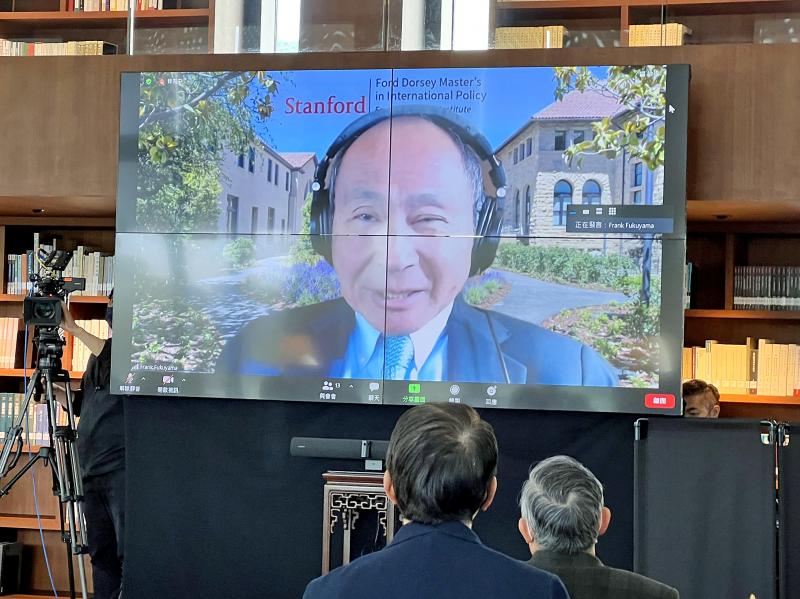Renowned US political scientist Francis Fukuyama yesterday said he thinks Ukrainians are much more willing to defend themselves than Taiwanese, which poses a significant threat to Taiwan’s future and independence.
Fukuyama, the Olivier Nomellini Senior Fellow at Stanford University’s Freeman Spogli Institute for International Studies, made the remarks in a speech titled “Threats to Liberalism and the Liberal World Order” in a virtual forum held by the Taipei School of Economics and Political Science Foundation.
Russia attacked Ukraine because it wants to undo the effects after the collapse of communism in 1991, he said, adding that Russian President Vladimir Putin feels threatened by Ukrainian democracy, which could motivate democratic movements in Russia.

Photo: CNA
“The geopolitical challenge from China is bigger than that from Russia,” he said. “Chinese power is much more multidimensional, in terms of economic, political and increasingly in military powers.”
One domain where Chinese power is not great is in the social and cultural dimension, as non-Chinese in general do not admire its society and do not want to live in the country, he added.
Since the rise of Chinese President Xi Jinping (習近平), China is evolving from an authoritarian to a totalitarian state, with its social credit system being the world’s most advanced surveillance network for the purpose of social control, he said.
International relations are now at an important junction, and depend on how the Russian attack on Ukraine plays out, he said, adding that China is observing how the US and other democracies respond.
Fukuyama also spoke of how the crisis relates to Taiwan’s relations with China.
“We are entering a geopolitical era in which unfortunately we have to take military threats and military power much more seriously,” he said.
“I’m afraid the actions that we thought were unthinkable a few years ago are now thinkable,” Fukuyama said regarding the possibility of China moving its military into Taiwan, adding that Taiwan should rethink its defense policy and reinstate mandatory military conscription.
“I think one of the differences between Taiwan and Ukraine is that, in my perception, the Ukrainians are much more willing to fight for themselves than Taiwanese people, and that poses a really big threat to Taiwan’s future and independence,” he said.
Some Taiwanese believe that the US would protect them in the event of war, but that would only happen if Taiwanese are willing to fight for themselves, he said, adding that the attitudes of Taiwanese and the sacrifices they are willing to make are essential.
Global democracies comprise the greatest share of economic and military power, but a large deficit is that domestic politics in many democratic countries are not supportive of strong international positions, including in the US, he said.

Intelligence agents have recorded 510,000 instances of “controversial information” being spread online by the Chinese Communist Party (CCP) so far this year, the National Security Bureau (NSB) said in a report yesterday, as it warned of artificial intelligence (AI) being employed to generate destabilizing misinformation. The bureau submitted a written report to the Legislative Yuan in preparation for National Security Bureau Director-General Tsai Ming-yen’s (蔡明彥) appearance before the Foreign Affairs and National Defense Committee today. The CCP has been using cognitive warfare to divide Taiwanese society by commenting on controversial issues such as Taiwan Semiconductor Manufacturing Co’s (TSMC, 台積電) investments in the

HELPING HAND: The steering committee of the National Stabilization Fund is expected to hold a meeting to discuss how and when to utilize the fund to help buffer the sell-off The TAIEX plunged 2,065.87 points, or 9.7 percent, to close at 19,232.35 yesterday, the highest single-day percentage loss on record, as investors braced for US President Donald Trump’s tariffs after an extended holiday weekend. Amid the pessimistic atmosphere, 945 listed companies led by large-cap stocks — including Taiwan Semiconductor Manufacturing Co (TSMC, 台積電), Hon Hai Precision Industry Co (鴻海精密) and Largan Precision Co (大立光) — fell by the daily maximum of 10 percent at the close, Taiwan Stock Exchange data showed. The number of listed companies ending limit-down set a new record, the exchange said. The TAIEX plunged by daily maxiumu in just

‘COMPREHENSIVE PLAN’: Lin Chia-lung said that the government was ready to talk about a variety of issues, including investment in and purchases from the US The National Stabilization Fund (NSF) yesterday announced that it would step in to staunch stock market losses for the ninth time in the nation’s history. An NSF board meeting, originally scheduled for Monday next week, was moved to yesterday after stocks plummeted in the wake of US President Donald Trump’s announcement of 32 percent tariffs on Taiwan on Wednesday last week. Board members voted to support the stock market with the NT$500 billion (US$15.15 billion) fund, with injections of funds to begin as soon as today. The NSF in 2000 injected NT$120 billion to stabilize stocks, the most ever. The lowest amount it

INVESTIGATION: The case is the latest instance of a DPP figure being implicated in an espionage network accused of allegedly leaking information to Chinese intelligence Democratic Progressive Party (DPP) member Ho Jen-chieh (何仁傑) was detained and held incommunicado yesterday on suspicion of spying for China during his tenure as assistant to then-minister of foreign affairs Joseph Wu (吳釗燮). The Taipei District Prosecutors’ Office said Ho was implicated during its investigation into alleged spying activities by former Presidential Office consultant Wu Shang-yu (吳尚雨). Prosecutors said there is reason to believe Ho breached the National Security Act (國家安全法) by leaking classified Ministry of Foreign Affairs information to Chinese intelligence. Following interrogation, prosecutors petitioned the Taipei District Court to detain Ho, citing concerns over potential collusion or tampering of evidence. The